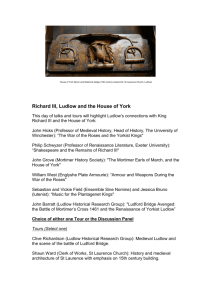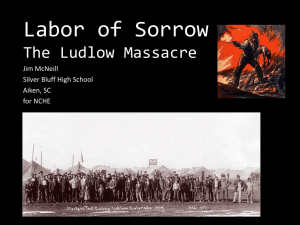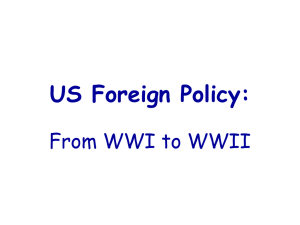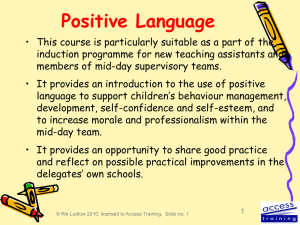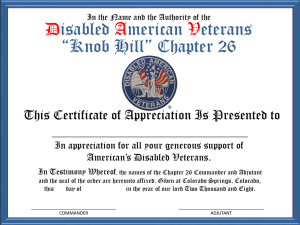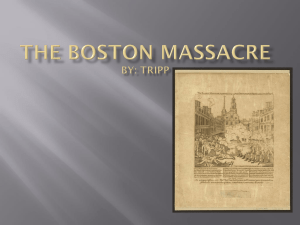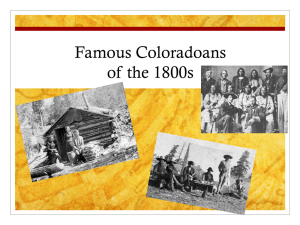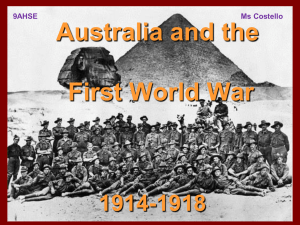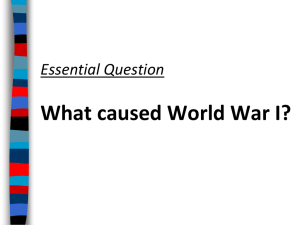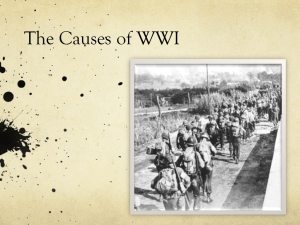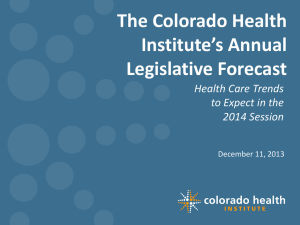Chronological Thinking and Teaching Multiple
advertisement
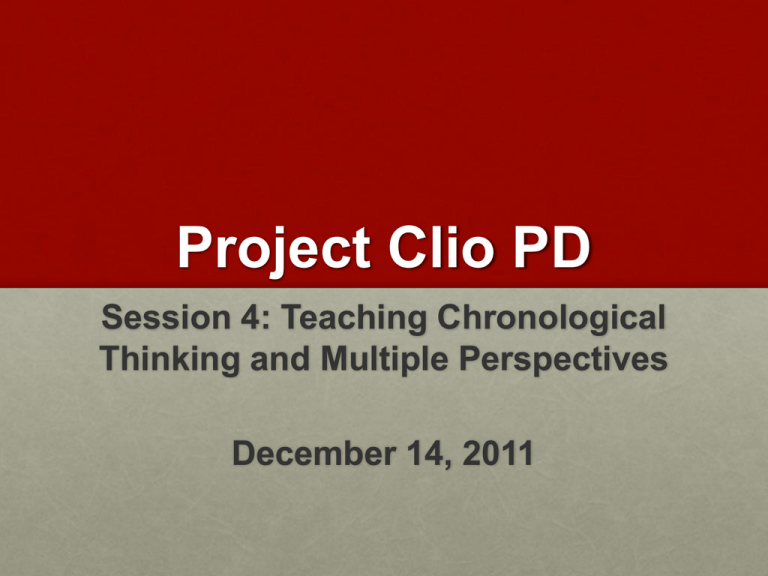
Project Clio PD Session 4: Teaching Chronological Thinking and Multiple Perspectives December 14, 2011 Putting today in context…. • Thinking historically • Text, subtext, and context • Chronological thinking and causality • Multiple perspectives • Develop chronology using sources employed by historians • More than temporal order • Instead it’s a critical determination of how the events along the line were determined to have a relationship with one another • Look for the causes of change in addition to the consequences of the change • Examine the relationships between names, dates, and events to determine why a particular event occurred. “Why Won’t You Just Tell Us the Answer?” uses the Railroad Strike of 1877 and the Bonus Army to teach chronological thinking, causality, and multiple perspectives. Using an image from the period under study is an effective way to begin an investigation into chronology and causality. What event is being depicted? What is the artist’s message about the event? Clues: •1914 •“Class War in Colorado” •Man is wearing a miner’s cap •Industry depicted in the background •Wounded woman and children •The Masses was a pro-union, pro-socialist journal •Black, sooty, coal-like drawing The Colorado coal strike and the ludlow massacre of 1914 • Read Ludlow Massacre Background from Howard Zinn’s “A People’s History of the United States.” • Watch clip from PBS documentary “Rockefellers.” Ludlow who’s who Louis Tikas Greek immigrant, union organizer at the Ludlow camp. Shot and killed by National Guard. John D. Rockefeller Jr. Owner of Colorado Fuel and Iron (CF&I) Mother Jones Organizer for the United Mine Workers of America (UMWA) Governor Ammons Governor of Colorado John Lawson United Mine Workers (UMWA) executive board member, led the strike at Ludlow Lamont Bowers Colorado Fuel and Iron (CF&I) Vice President John D. Rockefeller Jr. John Lawson, Mother Jones, and Horace Hawkins (1914) Unknown, John Lawson, Louis Tikas, Robert Harlan, 1914 Camp Beshoar–U.M.W.of A. Military Headquarters, Trinidad, Colorado. April 27th, 1914 Ludlow residents, 1914 Strikers tent colony, Ludlow, Colorado 1914 Caption reads “Members of the Colorado National Guard Entering the Strike District” Referred to as a “Ludlow Death Special” used by Baldwin-Felts’ hired strikebreakers Man examines pit beneath where a tent had stood on its platform (1914) Ruins of Ludlow tent colony, 1914 Red Cross Members Searching Ruins of Ludlow Tent Colony Line of funeral march for Ludlow victims, 1914 Louis Tikas funeral procession, Trinidad, Colorado, April 27th 1914 At your tables…. • In your envelope are 14 short primary documents related to the Ludlow Massacre. • Place the documents in chronological order. Remember it’s a critical determination of how the events along the line are determined to have a relationship with one another. • What factors played a role in how you determined chronology? • How did you decide where to put Woody Guthrie and David Mason? At your tables….. • Complete the following sentence stems: • We believe that the National Guard opened fire at Ludlow because……… • We believe that ___________________ was/were responsible for the decision to attack the camp at Ludlow because…………………….. Multiple perspectives Lesh describes multiple perspectives as “an approach that examines a historical event, person, or idea through the lens of its contemporaries, participants, or proximate chroniclers.” (95) Share out Woody Guthrie Ludlow Massacre-1944 Ludlow Massacre Words and Music by Woody Guthrie, 1944 It was early springtime when the strike was on, They drove us miners out of doors, Out from the houses that the Company owned, We moved into tents up at old Ludlow. I was worried bad about my children, Soldiers guarding the railroad bridge, Every once in a while a bullet would fly, Kick up gravel under my feet. We were so afraid you would kill our children, We dug us a cave that was seven foot deep, Carried our young ones and pregnant women Down inside the cave to sleep. That very night your soldiers waited, Until all us miners were asleep, You snuck around our little tent town, Soaked our tents with your kerosene. You struck a match and in the blaze that started, You pulled the triggers of your gatling guns, I made a run for the children but the fire wall stopped me. Thirteen children died from your guns. I carried my blanket to a wire fence corner, Watched the fire till the blaze died down, I helped some people drag their belongings, While your bullets killed us all around. I never will forget the look on the faces Of the men and women that awful day, When we stood around to preach their funerals, And lay the corpses of the dead away. We told the Colorado Governor to call the President, Tell him to call off his National Guard, But the National Guard belonged to the Governor, So he didn't try so very hard. Our women from Trinidad they hauled some potatoes, Up to Walsenburg in a little cart, They sold their potatoes and brought some guns back, And they put a gun in every hand. The state soldiers jumped us in a wire fence corners, They did not know we had these guns, And the Red-neck Miners mowed down these troopers, You should have seen those poor boys run. We took some cement and walled that cave up, Where you killed these thirteen children inside, I said, "God bless the Mine Workers' Union," And then I hung my head and cried. Answer at your tables: 1. To whom is this song addressed? Who is the “you” who “would kill our children,” and whose “soldiers” were waiting while the miners slept? 2. Guthrie mentions “wire fence corners” twice. What is he describing? Why is this important to understanding the song—or is it? 3. Do Guthrie’s lyrics accurately portray the event? Why or why not? 4. Guthrie wrote the lyrics 30 years after the event. Why do you think he was inspired to write them in 1944? Multiple perspectives Once an original interpretation is developed, present a final piece of evidence. Encourage students to reconsider chronology and how the new source might challenge their interpretation Mimicking that historians do not always have immediate access to all sources. Read one final document Read Julia May Courtney and answer the following questions at your table: 1. Julia May Courtney predicted that, “every workingman in Colorado and in America will not forget” the cry, “Remember Ludlow.” Is this true? If not, why? 2. Do you think the statement, “[F]or the first time in the history of the labor war in America the people are with the strikers” was correct? Do you think the people did support them? Why, or why not? Why would they support these strikers and not others? 3. Do you think there is another side to the Ludlow Massacre, other than that presented by Courtney and Guthrie? How would that side justify its actions? Share out • Key point: don’t let students dismiss a new artifact outright because it might contradict the interpretation they have already established. • Which artifact was most important in determining responsibility for the Ludlow Massacre? Ludlow r.a.f.t.(t) • ROLE • AUDIENCE • FORMAT • TOPIC • TIME AT YOUR TABLES: COMPLETE A R.A.F.T. FOR THE LUDLOW MASSACRE. Use the large piece of paper. WE WILL SHARE OUT Role Audience Format Topic Time (for advanced readiness students) John D. Rockefeller Ludlow Tent community survivors Speech Ludlow Massacre May 1914 Louis Tikas (Ludlow labor leader) Members of Congress Newspaper article Ludlow Massacre 1935 (FDR recently signed the Wagner Act protecting the rights of workers) President Woodrow Wilson Leadership of the United Mine Workers Political cartoon Ludlow Massacre 1947 (After recent passage of the Taft-Hartley Act, outlawing the closed shop weakening unions) Governor Ammons of Colorado Coal Mine Owners Play Ludlow Massacre December 14th 2011 Mother Jones (organizer for the United Mine Workers) President of the United Letter to the editor States at the White House Ludlow Massacre 1965 (Caesar Chavez recently formed the United Farm Workers) Strikebreaker for the Baldwin-Felts Detective Agency School children Song Ludlow Massacre 1981 (President Reagan recently broke the Air Traffic Controller strike) United States History Teacher A news reporter doing a story Personal journal entry Ludlow Massacre December 14th 2020 Closing Question From 1854-1856, Kansas was engulfed essentially by a civil war between pro- and antislavery forces. From September 1913 to April 1914, Colorado was similarly engulfed in violence that the New York Times referred to at the time as “the war in Colorado.” Standard history books refer to the violence in Kansas as “Bleeding Kansas.” Why do standard history books not apply a similar epithet to the violence in Colorado? Aftermath • UMWA ran out of money and called off the strike on December 10, 1914 • 400 strikers were arrested and 332 indicted for murder. • Only one man, John Lawson, was convicted of murder. Eventually the Colorado Supreme Court overturned the ruling. • 22 National Guardsmen received courts-martials although all but one were found not guilty. • Only guardsman found guilty was Lt. Linderfelt for his assault on Louis Tikas, although he only received a slight reprimand. Memorial built by UMWA in 1918 Ludlow Massacre Links http://www.antiwarsongs.org/canzone.php?lang=en&id=6492 http://www.kued.org/productions/fire/photos_stories/massacre.html http://www.youtube.com/watch?v=U6kuvBnNNUs http://www.youtube.com/watch?v=U6kuvBnNNUs http://www.denverposteducation.com/CHNC/Ludlow.pdf http://www.marxists.org/history/etol/writers/eastman/works/1910s/trinid.htm http://www.911omissionreport.com/ludlow_massacre.html http://upload.wikimedia.org/wikipedia/commons/5/53/Masses_1914_John_Sloan.jp g http://www.cobar.org/Docs/dexcerpts.pdf http://lamar.colostate.edu/~pr/ivylee.pdf http://www.c-spanvideo.org/program/200962-1 http://www.liveleak.com/view?i=bcf_1298112061 http://www.woodyguthrie.org/Lyrics/Ludlow_Massacre.htm http://notmytribe.com/2009/ludlow-massacre-or-unhappy-incident-87338.html http://ludlowsymposium.wordpress.com/about/ http://www.amazon.com/Ludlow-DAVID-MASON/dp/1597090832 http://www.pbs.org/newshour/bb/entertainment/jan-june10/davidmason_04-01.html http://www.pbs.org/wgbh/amex/rockefellers/tguide/hints.html
